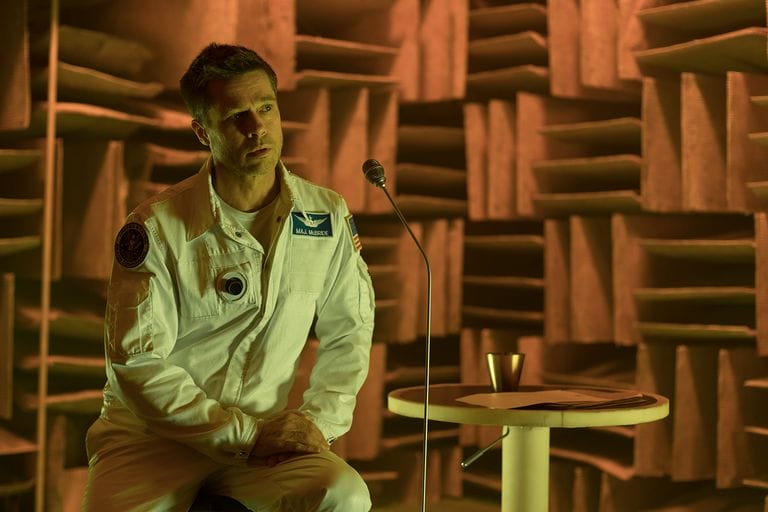
FRANCOIS DUHAMEL
There is a plaintive, grasping loneliness at the centre of Ad Astra, James Gray’s sensational sci-fi drama starring Brad Pitt as Major Roy McBride, a cool-headed astronaut in search of his father (Tommy Lee Jones), who has been missing in deep space for 29 years. The film has been billed as a thriller, but to define it as such does it a disservice. This is not a movie about failing oxygen supplies or existential quandaries or humanity’s place in the universe. Instead, Ad Astra is first-person cinema at its finest: an intimate, insular study of tortured masculinity, pulsating with an air of gentle melancholy that tugs at the heartstrings.
Rounding off a summer of rapturous notices for Once Upon a Time in Hollywood, Pitt astonishes in Ad Astra, turning in what may well be career-best work with his delicately calibrated acting. Informed by an old-school mentality of gender performance (men are strong; men are providers; men don’t cry), Roy has shaped his relationships in the mould of his withdrawn father, the man who deserted his 16-year-old son to pursue advanced alien life outside the solar system.
Left with a dearth of male role models, Roy numbs himself to the pain of abandonment by emotionally untethering himself from other people. He therefore jumps at the chance to be uprooted in space, seeking a reunion with his father 2.714 billion miles from home, as he prefers to be plunged into vacuumed nothingness rather than deal with earthly realities. Pitt teases glimmers of Roy’s inner turmoil in the nuances of his performance. He is in control of every muscle on his face – the crease of the forehead, the twitch of the cheek, the pursing of the lips – their slightest movements betraying the sentiments roiling feverishly beneath the surface (that Roy, in typically toxic-masculine fashion, does his best to repress).
Ad Astra also disperses clues to Roy’s turbulent mental state through the character’s contemplative voiceover, spoken in Pitt’s deflated, dialled-down monotone. On the whole, the film is quiet, muted even (the sound design delicate, the score haunting), allowing the narration to anchor our perspective and double as a sort of sentimental diary. It is significant that Roy’s self-hating musings – “He seems at ease with himself. What must that be like?”; “Why go on? Why keep trying?”; “I’m looking forward to the day my solitude ends” – remain unvocalised, trapped in his head along with his boxed-up feelings. When the taciturn Roy must speak aloud, he resists such candour. A softly uttered “I didn’t want you to leave”, a message meant for his estranged wife (Liv Tyler), is swiftly deleted, denoting a literal suppression of emotion that further highlights how Roy shuts himself off from relationships.

FRANCOIS DUHAMEL
Perhaps the most moving scenes in Gray’s psychological portrait of his solitary astronaut are the sparing yet wounding flashbacks. All too often lazy, expositional shorthand, here they are brief snatches of memory – Roy’s wife stroking his face in bed; a hazy blonde child hugging a man’s trouser leg – rattling through his addled mind as he blasts towards Neptune on a woozy, 79-day journey. Formerly subdued and stoic, Pitt builds on his previous flickers of feeling, gradually making them more and more surface-level before they explode out in a stirring crescendo: lugubrious eyes finally spurting out those ever-threatening tears, snarling cries roaring from within.
Ad Astra is more than a rescue mission, it is an emotional odyssey that strips the spectacle from sci-fi to expose the human impact interstellar travel can have, not on mankind but on just one man. Sure, there are visually stunning zero-gravity fights and lunar chases, but these set pieces function to emphasise the omnipresence of loss in Roy’s life. Gray grounds Ad Astra in a grief-stricken specificity and, in doing so, has created a beautifully interior film that celebrates the strength in vulnerability.
From: Harper’s BAZAAR UK



